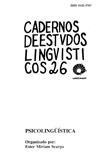Resumo
O presente estudo investiga as habilidades de consciência fonológica entre sujeitos repentistas e não-repentistas. Num estudo anterior nesta mesma área Roazzi, Dowker & Bryant (no prelo) encontraram uma habilidade superior dos repentistas em produzirem rimas em relação aos não-repentistas; além de apresentarem uma velocidade superior na produção da primeira rima. Ao contrário, na tarefa de consciência fonológica – adição e subtração de fonemas – os dois grupos de sujeitos não diferiram de modo significativo. A partir desses resultados, os autores concluíram que as habilidades dos repentistas parecem ser, ao mesmo tempo, altamente desenvolvidas e especializadas, corroborando o ponto de vista de que possa haver dissociações entre rima e algumas outras habilidades linguísticas como a segmentação fonológica. Ao se interpretar essa falta de diferenças em uma tarefa de consciência fonológica é necessário algum cuidado, porque um efeito de quase-teto pode ter obscurecido as reais diferenças entre os dois grupos. Procurando controlar esse efeito teto na tarefa de consciência fonológica, neste estudo sujeitos repentistas e não-repentistas foram avaliados em uma série de tarefas deste tipo com diferentes níveis de dificuldade. Os resultados mostram que as diferenças entre repentistas e não-repentistas aparecem somente nas tarefas de consciência fonológica que envolvem análises fonêmicas e que envolvem, de certa forma, a parte final da palavra. No final são discutidas as possíveis explicações destes resultados para uma melhor compreensão das pesquisas nesta área.
Referências
ALEGRIA, J. & MORAIS, J. (1979). Le dévelopment de l'habilité d'analyse phonétique consciente de la parole et l'apprendissage de la lecture. Archives de Psychologie, 47 (183, 251-270.
ALEGRIA J., PIGNOT, E., & MORAIS J. (1982). Phonetic analysis of speech and memory codes in beginning readers. Memory and Cognition, 10, 451-456.
BOWEY, L.A. & PATEL, K.R. (1988). Metalinguistic ability and early reading achievement. Applied Psycholinguistic, 9, 367-383.
BRADLEY, L. & BRYANT, P.E. (1983). Categorizing sounds and learning to read -- a causal connection. Nature, 301, 419-421.
BRYANT, P. MACLEAN, M.E., BRADLEY, L.L. & CROSSLAND, J. (199) Rhyme and alliteration, phoneme detection and learning to read. Developmental Psychology, 26 (3), 429-438.
BRYANT, P.E. & BRADLEY, L. (1985). Children's reading problems. Oxford: Blackwell.
BYRNE, B. & LEDEZ, J. (1983). Phonological awareness in reading-disabled adults. Australian Journal of Psychology, 35, 175-184.
CARY, L., MORAIS, J. & BERTELSON, P. (1987). A case study: The metaphonological abilities of an illiterate poet. Poster presented at the 2nd Meeting of the European Society of Cognitive Psycology, Madrid, 7-11 september 1987.
DOWKER, A.D. (1989). Rhyme and alliteration in poems elicited from young children. Journal of Child Language, 16, 181-202.
LIBERMAN, I.Y., SHANKWEILER, D., LIBERMAN, A.M., FOWLER, C. & FISCHER, W.F. (1977). Phonetic segmentation and recording in the beginning reader. In A.S. Reber & D.A. Scarborough. (Eds.), Towards a Psychology of Reading. Hillsdale, N.J.: Lawrense Erlbaum associates.
LUNDBERG, I. (1978). Aspects of linguistic awareness related to reading. In A. Sinclair, R. Jarvella, & W. Levelt (Eds.), The child's conception of language (pp. 83-96). New York: Springer-Verlag.
LUNDBERG, I., OLOFSSON, A. & WALL, S. (1980). Reading and spelling skills in the first school years predicted from phonemic awareness in preschool children. Reading Research Quarterly, 23, 263-284.
MANN, V. (1986), Phonological awareness: the role of reading experience. Cognition, 24, 65-92.
MORAIS, J. (1988). Constraints on the development of phonetic awareness. Trabalho apresentado no 'Symposium on Phonological Processes in Literacy to honour the research of Isabelle Y. Liberman, 39th annual conference of the Orton Society', November 11th, 1988, Tampa, Florida.
MORAIS J., CARY., ALEGRIA, J. & BERTELSON, P. (1979). Does awareness of speech as a sequence of phones arise spontaneously? Cognition, 7, 323-331.
NESDALE, A.R., HERRIMAN, M.L. & TUNMER, W.E. (1984) Phonological awareness. In W.E. Tunmer, C. Pratt & M.L. Herriman. (Eds.), Metalinguistic Awareness in Children: Theory Research and Implications. Berlin: Springer-Verlag.
OLOFSSON, A. & LUNDBERG, I. (1985). Evaluation of long term effects of phonemic awareness training in kindergarten: Illustrations of some methological problems in evaluation research. Scandinavian Journal of Psychology, 26, 21-34.
OLOFSSON, A. (1985). Effects of the phoneme awareness training in kindergarten on the use of spelling-sound rules in Grade 2. Capitulo da tese de Doutorado: Phonemic awareness and learning to read: a longitudinal and quasi-experimental study. Departmente of Psychology, University of Umea, Sweden.
READ, C., ZHANG, Y., NIE, H. & DING, B. (1986). The ability to manipulate speech sounds on knowing alphabetic reading. cognition, 24, 31-34.
ROAZZI, A. & CARVALHO, M.R. (1991). Metalinguistic awareness and reading development. Anais do XIV International School Colloquium, Braga, Portugal. De 22 a 27 de Junho.
ROAZZI, A. & CARVALHO, M.R. (submetido). Leitura e consciência metalingüística: Resultado da aprendizagem da leitura ou pré-requisito? Revista Brasileira de Estudos Pedagógicos.
ROAZZI, E. & DOWKER, A. (1989). Consciência fonológica, rima e aprendizagem da leitura. Psicologia: Teoria e Pesquisa, 5 (1), 31-55.
ROAZZI, A. (1991) Explicações causais em desenvolvimento cognitivo: A relação entre consciência fonológica e leitura. Em M.L.P. Barbosa Franco & R.M.S. Macedo (Eds.), Anais do Illo Simpósio Brasileiro de Pesquisa e Intercâmbio Científico, pp. 14-26. Aguas de São Pedro, SP, 26 à 30 de agosto de 1990. São Paulo: ANPEPP -- Pós-Graduação em Psicologia PUC/SP.
ROAZZI, A., DOWKER, A. & BRYANT, P.E. (no prelo - a). A arte do repente e habilidades lingüísticas. Revista Brasileiras de Estudos Pedagógicos.
ROAZZI, A., DOWKER, A. & BRYANT, P.E. (no prelo) -b). Phonological abilities of Brazilian street poets. Applied Psycholinguistics.
SAYWITZ, K. & WILKINSON, L.C. (1982). Age-related differences in metalinguistic awareness. In S. Kuczaj, II (Ed.), Language Development: Vol.2. Language, Thought and Culture. Hillsdale, N.J.: Lawrence Erlbaum Associates.
TUNMER, W.E. & BOWEY, J.A. (1984). Metalinguistic awareness and reading acquisition. em W.E. Tunmer, C. Pratt & M.L. Herriman (eds.), Metalinguistic awareness in children. Berlin: Springer-Verlag.
O periódico Cadernos de Estudos Linguísticos utiliza a licença do Creative Commons (CC), preservando assim, a integridade dos artigos em ambiente de acesso aberto.

